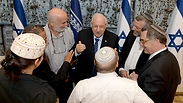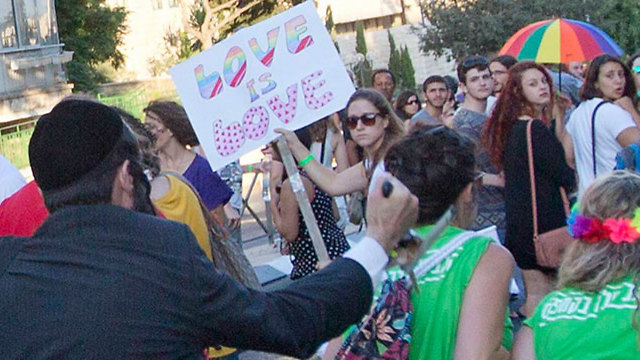
Reform and Conservative Jews at the President's Residence. 'We must admit they are partially right'
צילום: מארק ניימן, לע"מ
Halacha must change for the Jewish people's future
Op-ed: As we cannot remain silent and let the new reality get swallowed by radical views, there is a need to write new halachic texts matching our era.
During a recently held event, I was approached by the principal of one of the biggest schools in the Zionist-religious public, who asked me what she should say about homosexuality, considering the events of the past summer.
"The fact that one must not murder is clear, but what should we say about the matter itself? After all, the Torah has very firm things to say against homosexuality. What is our fundamental stance?
I replied that I believe we should honestly admit we once again don’t know the biblical answer, as it clearly appears that the Torah says one thing and reality say another thing. We cannot deny the right, status and dignity of homosexuals - even if it is written in the Torah.
In my opinion, this issue, like many other issues, requires a new answer pertaining to the Torah, which does not rely mainly on the existing biblical corpus. What can we do: With all the wisdom, the farsightedness, the depths and the knowledge which exist in generations of Halacha books, their writers did not face the radically new reality the Jewish people are facing today.
The Halacha books don't tell us how to run a modern state and what happens when Jews become a majority in the state and are responsible for a non-Jewish minority. The treatment of women, children, foreigners and homosexuals requires a conceptual and halachic renewal as well, as does the conversion issue.
Because of the freeze in the main biblical thought, which characterizes the past few decades, we are witnessing two extremely dangerous processes, which feed each other: The fundamentalist process and the ultra-liberal process.
The fundamentalists, who are incapable of bridging between our ancient culture and modern reality, are demanding that we all go back to the past, to the perfect reality which allegedly ruled the roost at the time, when everyone knew where they belonged since the creation of the world. The murder of Shira Banki at the Jerusalem pride parade was carried out by such a person, a sort of Jewish version of the Islamic State.
The ultra-liberals, on the other hand, want to uproot the Jewish uniqueness and turn all of us into citizens of the global world, where values are determined according to the ratings of economically or politically powerful groups.
These two groups appear in and influence the world of Torah, where the main stream of the sane and life-seeking religious society hardly speaks out. The terrible confusion in light of the gap between the holy text and reality silences the finest people.
The fear of being identified with the Reform Movement and with its anti-halachic stance creates a situation in which the central world of Torah has become resistant to changes. Any suggested change, even by leading figures, is perceived as a destruction of the Torah and as a deterioration down a slippery slope which ends in assimilation.
The fear of the reform and of the danger of assimilation blinds one's eyes from recognizing the fact that Reform Jews are partially right, and even those who don’t agree with them must take responsibility for the changing reality, which requires answers on a lot of enormous issues.
As there really is no choice and we cannot remain silent and let reality get swallowed by the radical views, there will be a need to write new halachic texts matching our era.
This has already happened in the past, when we had prominent people who dealt with the changes of reality out of responsibility for the nation's future. Great Jewish scholar Yohanan Ben Zakkai, for example, who realized that without adapting the Torah to the radically changed reality after the destruction of the Temple, the people will have no future.
Because our challenge is not the future of the text, but the future of the people and society. Halacha must change in order for us to have a people.











